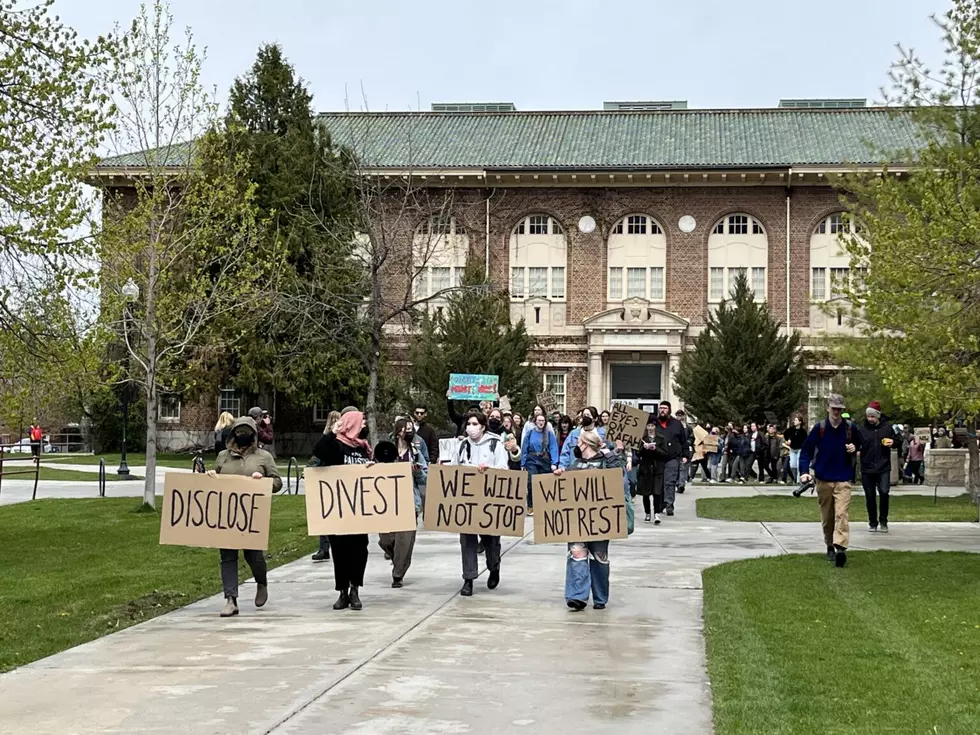
Handful of UM students call protest for Gaza ceasefire
Keila Szpaller
(Daily Montanan) More than 100 people at the University of Montana demonstrated Wednesday to protest Israel’s bombing of Gaza and to show solidarity with protesters arrested this week on other campuses.
“Israel, Israel. Stop the slaughter. Gaza must have food and water,” they chanted.
The UM demonstrators asked spectators to keep their focus on children who are dying, a count the Washington Post put at 13,000 this week.
“While you are here watching us, children are being murdered with your tax dollars,” said one demonstrator with a bull horn.
Nearly 1,000 arrests had taken place on campuses across the country as of Monday including in violent clashes between police and pro-Palestian protestors from New York to California, according to a count from the Associated Press.
The demonstration at UM in Missoula was peaceful. A law enforcement SUV was parked near the Oval but rolled away after the group started marching.
The death toll in Gaza has surpassed 34,000, according to a report this week from the Wall Street Journal citing health authorities. However, the story said it’s becoming difficult to keep up with the number of fatalities because many hospitals aren’t functioning, and people are buried under rubble.
Students from UM and also high schools were among those demonstrating with chants, chalk art after the rain subsided, and signs.
Some signs called on the UM Foundation to divest, joining calls at more than 80 other campuses across the country to redirect higher education investments from funding war, according to the Chronicle of Higher Education.
The UM Foundation is the university’s fundraising nonprofit, and in a statement, it said its board “is committed to responsible investment stewardship” to generate the “highest levels of returns” to support UM for generations.
“The Foundation’s endowment portfolio has no direct investments with weapons manufacturers,” said the UM Foundation board in a statement.
Journey Lynn, a UM graduate student in social work, said they joined the demonstration because the crisis in Gaza is deplorable: “I think that calling attention to the genocide is imperative.”
Lynn also said as a student pursuing a master’s in social work, they believe the protest aligns with the code of ethics from the National Association of Social Workers.
“The essence of a lot of those values are to honor and value all life,” Lynn said.
At least one legislator, Rep. Zooey Zephyr, a Missoula Democrat, joined the protest. Demonstrators started the action in front of Main Hall and then marched around the Oval carrying signs raised with their messages.
“Free Palestine.” “Israel Bombs Hospitals.” “Food Is Not A Weapon.” “Ceasefire NOW.” “Fund Schools Not Genocide.”
As the demonstration began, one man carrying a flag of Israel walked in front of the group and yelled at them. Jon Murphy stayed with the demonstrators in their march around the Oval.
He told the Daily Montanan he wanted to stand up for Israel’s right to exist as a state. Murphy said he is not a student at UM but lives in the community.
“I don’t agree with everything that Israel does, but it has a right to exist, and the people have a right to live there without getting the rockets and missiles sent at them,” Murphy said.
The recent war started in October 2023 after Hamas, a Palestinian militant group, attacked Israel and killed at least 1,200 people. Israel then launched military strikes in Gaza, a small strip of land 25 miles long between Israel and the Mediterranean Sea.
A recent food insecurity analysis said famine is imminent in at least the north of Gaza, and it projects more people will die. The report from the Integrated Food Security Phase Classification (IPC) Famine Review Committee (FRC) said the entire population of 2.23 million faces acute food insecurity.
“The FRC concludes that famine is imminent unless there is an immediate cessation of hostilities and full access is granted to provide food, water, medicines, and protection of civilians as well as to restore and provide health, water, and sanitation services, and energy (electricity, diesel, and other fuel) to the population in the northern governorates,” the report said.
The IPC describes itself as an initiative to improve food security and analysis based on science and one led by a global partnership of 15 organizations.
